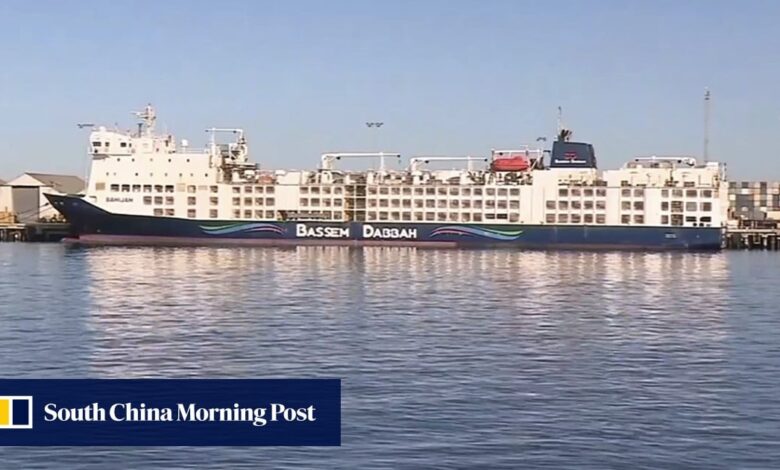Australian livestock stuck in limbo on ship in Perth as second vessel heads to Red Sea

[ad_1]
The MV Bahijah set out for Israel on January 5 carrying around 14,000 sheep and 2,000 cattle but diverted due to threat of attack and was ordered home by the Australian government. It arrived in Perth in Western Australia on Monday during a summer heatwave.

Biosecurity rules mean the animals cannot disembark without being quarantined. Australia’s agriculture ministry said it is still considering an application by the exporter, Israeli firm Bassem Dabbah, to unload some animals and send the rest back to sea for a voyage of roughly 33 days to reach Israel by going around Africa.
Officials say the livestock are in good health, but some politicians and animal rights activists claim their plight amounts to cruel mistreatment and have called for Canberra to bring forward a planned ban on live sheep exports.
“Australia’s biosecurity and the health and welfare of the livestock on board are our highest priorities,” the agriculture ministry said.
Israeli animal groups Let the Animals Live and Animals Now said they had filed legal proceedings seeking to prevent the animals on board the Bahijah from being imported into Israel.
The Israeli government did not immediately respond to a request for comment.
Stop ‘selfish selfies’: wildlife charity denounces cruel animal photo trade
Stop ‘selfish selfies’: wildlife charity denounces cruel animal photo trade
Meanwhile, another livestock carrier, the Jawan, set sail from Australia for the Jordanian port of Aqaba on Thursday, according to ship tracking data on Refinitiv Eikon.
On board are around 60,000 animals, most or all of them sheep, said John Hassell, head of farm group WAFarmers.
The Australian agriculture ministry said it had approved the vessel to sail “with a contingency plan including that it cannot enter the Red Sea unless the department (ministry) gives approval to do so 72 hours before they enter the Red Sea.”
If the vessel cannot enter the Red Sea, it will unload in the Gulf and the animals will be trucked overland to Jordan, a source familiar with the matter said.
Reuters was unable to contact Bassem Dabbah or Jawan Compania Naviera SA, listed by Refinitiv as the owner of the Jawan.
The Bahijah’s manager, Korkyra Shipping, did not respond to requests for comment. The Jawan’s listed manager, MC-Schiffahrt GmbH & Co KG, did not immediately respond to a request for comment.
Australia’s live export industry shipped more than half a million sheep and half a million cattle overseas last year.
[ad_2]
Source link





